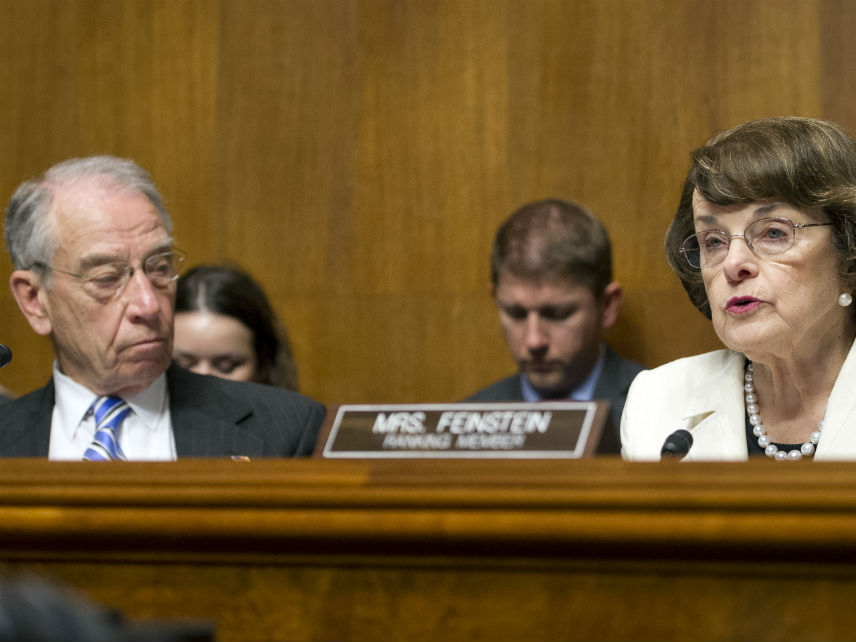Law Enforcement Groups Oppose Senate Sentencing Reform Bill, Again
Hardline prosecutors continue to beat the drum against any reduction in mandatory minimums.

A group of prosecutor and police organizations are lining up again to oppose the bipartisan Sentencing Reform and Corrections Act that would reduce some federal mandatory minimum sentencing guidelines.
Concerted opposition by hardline law enforcement groups and a small core of conservative Republicans helped torpedo the same bill in the last session of Congress, at the time considered by criminal justice advocates to be one of the best chances in more than a decade to pass major legislation.
After the bill was initially introduced in 2015, Senate Judiciary Committee chairman Chuck Grassley (R-Iowa) and bipartisan co-sponsors watered it down significantly to assuage hardline conservatives like Sen. Tom Cotton (R-Ark.). The compromise bill would have reduced some mandatory minimum sentencing guidelines, eliminating none, and adding new ones for crimes such as interstate domestic abuse and fentanyl trafficking.
The bill was reintroduced this September by Grassley and Sen. Dick Durbin (D-Ill.), but law enforcement groups still say it goes too far. In a letter to Republican and Democrat leaders on the Senate Judiciary Committee released Tuesday, the National Association of Assistant U.S. Attorneys, the National Sheriffs Association, and four other law enforcement groups warned that the proposed legislation "undermines mandatory minimum penalties for drug trafficking and weakens the tools that law enforcement authorities need to enforce the law, prosecute criminals and dismantle domestic and international drug trafficking organizations."
The letter cites rising violent crime in some major cities and "a national epidemic of overdose deaths, caused largely by heroin and opioid drug abuse," as a reason not to take those tools away.
Families Against Mandatory Minimums (FAMM), and other advocacy groups have long argued federal mandatory minimum sentencing guidelines are incredibly punitive and an ineffective crime deterrent.
"These groups are making a strange argument: We have the worst drug overdose crisis in history and so we should keep doing exactly what we are doing," says Kevin Ring, the president of FAMM. "This letter comes on the heels of a new report by the US Sentencing Commission, which concluded that mandatory minimum sentences are being applied to too many low-level drug offenders. Senator Grassley's bill actually addresses that misuse of resources."
Law enforcement groups not only want the U.S. to continue its current criminal justice policies; they contend the relatively modest drop in the federal prison population is, in part, responsible for the rise in violent crime rates nationally.
"Misguided legislation like the Sentencing Reform and Corrections Act comes about when myth and misunderstanding overwhelm fact and reality," the letter says. "The assertion that the federal prison population is exploding is myth; the federal prison population is, in fact, decreasing and the rate of decrease—and the likely relationship to the rise in violent crime—will only accelerate as early releases continue as a result of unworthy changes."
U.S. Attorney General Jeff Sessions has in many of his public speeches and written op-eds explicitly linked the drop in federal prison population—a result of several changes to prosecutor charging policies for drug offenses under former Attorney General Eric Holder—to the rise in crime rates.
As my Reason colleague Jacob Sullum has explained, it's nonsensical to attribute a modest drop in the federal prison population, accounting for 14 percent of the 2.2 million incarcerated people in the U.S., to a national crime wave:
Even if we assume that every drug offender who got relief under Holder's policy was a violent predator in disguise, there were not enough of them, and they would not have been free soon enough, to have any noticeable impact on the crime rate. Perhaps Sessions means that other criminals, taking note of the fact that some federal drug offenders who previously might have gotten five years in prison were now getting two or three years instead, were emboldened to commit violent crimes. That scenario is, if anything, less plausible.
In fact, the Justice Department Inspector General released a report this year on the impact of Holder's 2013 policy change that found it was unevenly applied and "national trends should not be interpreted in such a way as to conclude that Smart on Crime had a uniform impact across all the nation's districts."
The similar rhetoric of Sessions, a staunch opponent of criminal justice reform efforts when was a U.S. senator, and the NAAUSA is no coincidence. The former head of the NAAUSA, Steve Cook, now is an assistant deputy attorney general at the Justice Department, where he is leading the response to President Trump's executive order to crack down on violent crime and "American carnage," as Trump put it in his inaugural address.
Without support from the Justice Department, the Sentencing Reform and Corrections Act will face a much harder road to the Senate floor. In return for watering down the bill to address the concerns of conservative prosecutors and senators, Grassley and the bipartisan group of lawmakers who negotiated the bill may once again get nothing.
"Prosecutors' groups like to say they only enforce the laws that Congress writes," Ring says. "This letter is a useful reminder that these groups actually lobby for laws that increase their power and often use scare tactics to get them."


Show Comments (10)